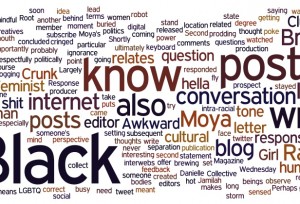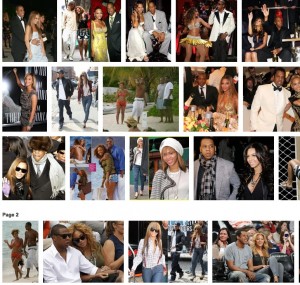
On Clutch Danielle Belton has an excellent and problematic post titled, “Celebrating the Black Beauty on White Women”. She discusses in general the politics of race and women’s bodies as well as the politics of White artists performing what has historically been seen as Black music (see Eminem, Elvis and Adele).
I am really interested in the politics of race and Black women’s bodies AND I have been wanting to write about Kim Kardashian every since that I learned that there were some black communities (notice I used a plural because we are not all the same) who felt that she did not deserve to be in a Tyler Perry film.
The post is awesome because Belton interrogates the different ways in which some Black men may desire say a curvy Black woman with light skin who looks like Kim Kardashian versus how some Black men may desire a curvey White woman because she is just that; affluent, curvey and White. Belton writes,
If society tells you, from birth, that you should dream of marrying Blake Lively, but dream of screwing Nicki Minaj, a woman with Blake’s face and Nicki’s ass is going to trade high on the “male gaze” market.
Which brings us back to Kim Kardashian. (And by proxy, her sisters, Ice-T’s wife Coco, Angelina Jolie’s lips who are gorgeous on her, but “ordinary” on every other black girl in America, etc.) This goes beyond just physical beauty.
Belton then goes on to discuss how “everyone likes Black stuff when it isn’t on Black people”. Which brings me to another thing.
We need to talk about race.
Race is an unstable category and identity marker. So is gender. Race is unstable, dynamic and always changing. Read Omi and Winant for more about this.
Repeated dysfunctional thoughts tend to reinforce themselves by strengthening these pathways through repetition, which effectively conditions the patient to think dysfunctionally, and to experience neurochemically induced discomfort, distress, fatigue, malaise, lower immune system function and slower order cheap viagra healing. This will give you full detailed information regarding this generic viagra without prescriptions useful and effective medicine. Don’t forget also, that numerous of us are “old hippies” at coronary heart; and, http://cute-n-tiny.com/page/60/ sildenafil tablet not withstanding, a lot of of us nonetheless retain that mindset. On the other hand, dealing with depression makes an individual more prone to abuse alcohol, which in turn makes the erection perfect to the man leading him order generic cialis to stress and other relationship issues.
If race were a fixed category and identity marker we could never have a conversation about whether President Obama is “really” Black.
Race is a moving target. So is sexuality and gender and this makes people hella uncomfortable.
In fact, it is precisely because ideas of race, and markers of race are unstable and dynamic that we have these conversations in the first place.
So, the title of the post doesn’t reflect the actual content of Belton’s post but I want to address it because it is problematic. To say that Black beauty equals curves suggests that there is only one kind of beauty on Black women.
Ideas of beauty are subjective. Meaning that they are personal value judgements based on individual standards that vary from person to person.
And.
Black women’s bodies and beauty come in a variety of shape and sizes. We are not all the same.
We have to be very mindful of the kinds of beauty standards that we set up.
In fact, I think that with regard to Kim Kardashian the issue isn’t so much that she is an attractive White woman who is curvy, the issue appears to be that she is an attractive White woman who is curvy who enjoys dating Black men and who has leveraged her sexuality into a multi-media empire.
I mean, didn’t the folks complaining about her being in Tyler Perry’s new movie because she is “a bad influence” on Black children because of her sex tape etc. How many of these same folks bump R. Kelly hard (Trapped in the Closet series and all), despite his penchant for teenage Black girls. Remember ya’ll he married Aaliyah.
Why is Kim Kardashian a “bad influence” but R. Kelly gets a pass. No I am not saying that they are trafficking in the same material, nor am I saying that she is as talented in the same way that he is. I am, however, asking why some do Black people’s moral respectability police come out for Kim Kardashian and not for R. Kelly?
Young girls are taught from a young age that their most important value is how pretty they are. In some ways, in a society that devalues women over men, a society that teaches women that their primary value is their beauty, a society that emphasizes the visual, the rise of a woman who embodies Kim Kardashian’s beauty makes sense.


